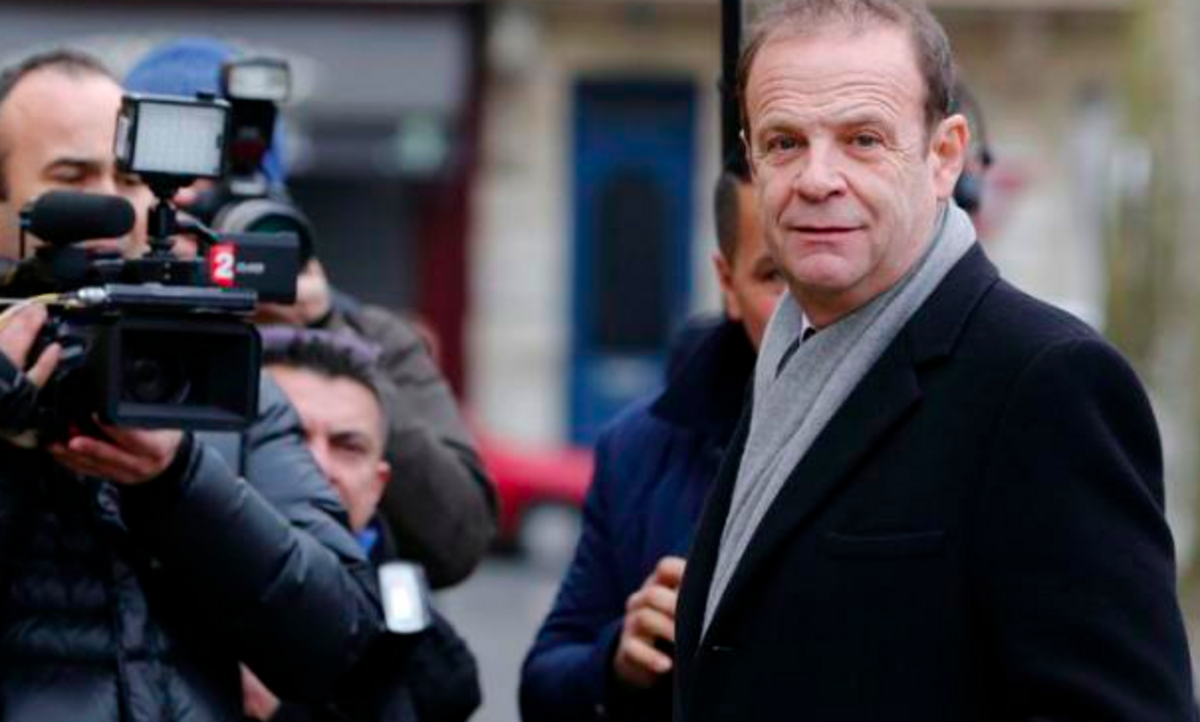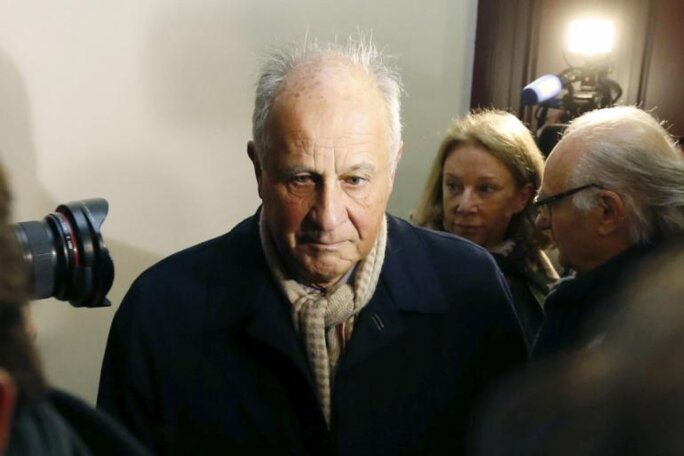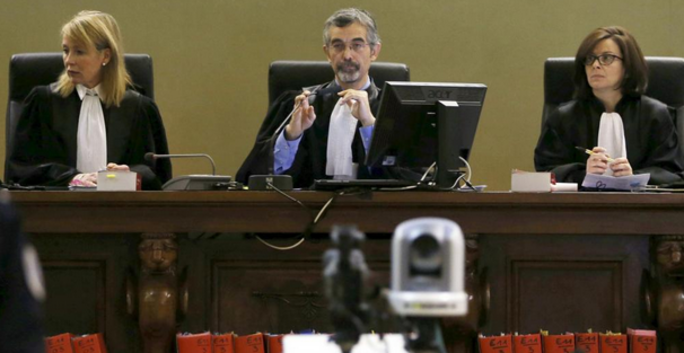After three weeks of lengthy hearings, and with another two weeks of the court case still to run, it has become clear that the evidence and arguments are stacking up against François-Marie Banier, the celebrity photographer, writer and high-society dandy, whose unusual relationship with L’Oréal heiress Liliane Bettencourt, now aged 92, lit the fuse of what has become dubbed ‘the Bettencourt affair’. Just as they are also for Patrice de Maistre, Bettencourt’s former wealth manager.
While he may have been close to the dementia-suffering billionaire for some 20 years, and while she undoubtedly had the right to shower him with gifts and favours, Banier’s manipulating behaviour of the old lady at a time when she was suffering mental decline has left a strong sense of malaise in the courtroom, all the more so given the colossal sums of money he sought and accepted from her.

Enlargement : Illustration 1

Banier, 67, has attempted to project himself as a disinterested artist with his head in the clouds, while also being the outraged victim of a hypothetical domestic plot (see more on early hearings here). But this has been undone by the facts of the case heard so far, and appears to have often alienated the presiding magistrates during their questioning of him.
As for Patrice de Maistre, 65, who has alternated between protesting his innocence and declarations of self-pity, he has been unable to shrug off the damning evidence of the enormous benefits he asked for and obtained from the L’Oréal matriarch, exploiting his position as her manager and advisor and protector. The playing to the court of the so-called ‘Butler tapes’ – the clandestine sound recordings, revealed by Mediapart and later censored, containing his and others' often outrageous conversations with Bettencourt, secretly taped by her major domo – have further aggravated his case.
Despite the energetic defence of their lawyers, it is hard to envisage that either Banier or Maistre will escape a sentence at the end of the proceedings. For both men, what is at stake now appears to be to limit as far as possible the severity of the sentencing, whether that be a prison sentence, a fine or payment of damages. The tax authorities, meanwhile, have already launched a readjustment procedure against them for sizeable tax payments in arrears.

Enlargement : Illustration 2

The other almost certain outcome is the acquittal of Éric Woerth, former conservative budget and later labour minister under Nicolas Sarkozy, whose presence in the box centres upon his alleged extortion, with the complicity of Maistre, of massive sums of cash from Bettencourt’s secret Swiss bank account. It is alleged that Maistre handed a total of 150,000 euros in cash to Woerth, when he was the election campaign treasurer for Sarkozy’s 2007 presidential bid. Woerth was questioned for just one hour, during which public prosecutor Gérard Aldigé displayed an all but obsequious regard towards him, as if it was already established that the cash donations were impossible to prove.
That was all the more astonishing given that the case has heard evidence that the Bettencourt household was once the scene of regular visits by politicians who received cash-stuffed manila envelopes, and that the agendas of both Woerth and Maistre have revealed that the pair held unusual meetings during the pre-election period in 2007 when important sums of cash were withdrawn – without any other explanation - from the Bettencourt accounts in Switzerland and in France.
Furthermore, Liliane Bettencourt’s former bookkeeper, Claire Thibout stuck to her account of the cash donations intended for Woerth throughout the four hours of questioning she was submitted to by defence lawyers during her testimony via a live videoconference link with Paris on February 10th.
Meanwhile, it is predictable that the conservative UMP party, whose leader Nicolas Sarkozy faces several corruption investigations, will seize an acquittal of Woerth to launch a backlash against the magistrates who headed the investigation that led to the trial – and who in 2013 dismissed the case against Sarkozy before bringing charges against Woerth. During and after his term as president, Sarkozy has led a visceral campaign against the powers lent to examining magistrates who lead judicial investigations, and who he at one point unsuccessfully sought to abolish by replacing them with politically-dependent public prosecutors. The backlash will undoubtedly be all the louder if, as is also now likely, former International monetary Fund chief Dominique Strauss-Kahn is acquitted of pimping charges in an ongoing trial in Lille.
Influence peddling trial to follow
Of the seven other defendants in the Bettencourt case, nothing yet appears certain. These are: Martin d'Orgeval, Banier’s partner, charged with “abuse of frailty” (taking advantage of Bettencourt’s diminished mental faculties); lawyer Pascal Wilhelm, who succeeded Patrice de Maistre as wealth and investment manager for Liliane Bettencourt, also charged with “abuse of frailty”; facing the same charge again is Stéphane Courbit, a reality TV show and online gambling entrepreneur and client of Wilhelm, whose company LOV received more than 143 million euros from Bettencourt in when Wilhelm was her manager in 2011; Alain Thurin, former nurse to Bettencourt who, in her revised will, was bequeathed 10 million euros; solicitor Patrice Bonduelle, accused of“conspiring in abuse of frailty” with Wilhelm, and another solicitor, Jean-Michel Normand, accused of complicity withFrançois-Marie Banier, Martin d'Orgeval et Patrice de Maistre in exploiting Bettencourt’s diminished faculties; Carlos Cassina Vejarano, a former administrator of Bettencourt’s Seychelles island d’Arros, charged with “abuse of frailty” and “fraud” for having misappropriated the funds allocated for the upkeep of the Indian Ocean property.

Enlargement : Illustration 3

While Banier’s partner Martin d'Orgeval accepted expensive presents from Bettencourt, the trial has not established, at least until now, that he joined Banier in directly manipulating the mentally-confused billionaire. Lawyer Pascal Wilhelm, who had a rough ride during his two days in the box, told the court that the 143 million euros of her money he placed in Courbit’s company was a wise investment, despite the fact that other potential investors declined to join her. Courbit, who used part of the money from Bettencourt to pay of his company’s debts and the placed the remainder in donations to his children, told the court on Friday February 13th that he had simply followed the advice of his friends Wilhelm, disgraced former Vivendi CEO Jean-Marie Messier and the businessman Alain Minc. Courbit denied the suggestion that Liliane Bettencourt believed he was a singer.
The court heard how Bettencourt had given a statement saying she had no recollection of the investment made in Courbit’s company, nor did she remember anything of Courbit himself.
Public prosecutor Gérard Aldigé offered Courbit’s defence lawyers surprising support when he reminded the court that proof of the crime of ‘abuse of frailty’ required that it be established that the victim had suffered a “seriously prejudicial” act. That indeed could be interpreted as somewhat difficult to quantify, given that Liliane Bettencourt’s wealth is estimated by Forbes to total 34.6 billion euros (39.5 billion dollars), making her the tenth richest person in the world. In other words, the public prosecutor is arguing that the moral issue of the charge is not of importance. Moreover, shortly before the trial began, and after much palaver, Courbit reimbursed the 143 million euros he received, a refund topped with 15 million euros in interest payments.
Thus far then, despite Bettencourt’s dementia being demonstrably favourable to them, the likely outcome for Wilhelm and Courbit remains in doubt. As it does also for the solicitors. Jean-Michel Normand, 80, was responsible for drawing up the legal papers concerning the enormous sums of Bettencourt’s money received by Banier and Maistre. He and his colleague Patrice Bonduelle insist they were only doing their job.
Further confusing matters is the absence from the trial, for health reasons, of nurse Alain Thurin and Carlos Cassina Vejarano, the former having attempted suicide shortly before the hearings began.
Whatever the final outcome at the end of this month for Patrice de Maistre and Eric Woerth, the two men will again stand trial, this time on charges of influence peddling, on March 23rd in a second judicial chapter of the Bettencourt affair. Woerth is accused of awarding of the Légion d’honneur - France’s highest recognition of civil merit - to Maistre in return for his hiring of Woerth’s wife Florence as a highly-paid investment advisor with Bettencourt’s asset management company Clymène.
-------------------------
The French version of this article can be found here.
English version by Graham Tearse


